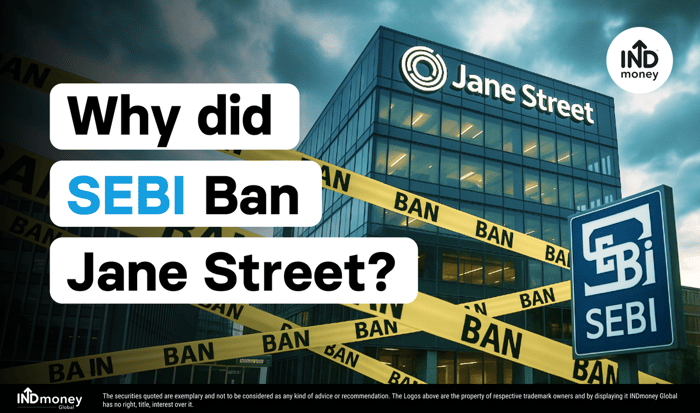
- What Happened with Jane Street?
- Step 1: Jane Street created an Illusion of Demand
- Step 2: Jane Street made a bet that Apple juice price will go down
- Step 3: Jane Street started dumping the Apples
- What Are The Key Findings from SEBI’s Investigation on Jane Street
- Why SEBI’s Action on Jane Street Matters
- Final Thoughts: Protecting the Retail Ecosystem
SEBI on July 3, 2025, issued an interim order banning Jane Street Group and its Indian affiliates from trading after uncovering a sophisticated case of index manipulation in the Indian stock market, particularly around BANKNIFTY options on expiry days.
Jane Street, a globally renowned proprietary trading firm, reportedly made over ₹43,000 crore in profits from index options in just over two years, while simultaneously incurring losses in the cash and futures markets. This raised red flags.
But what exactly did Jane Steet do, and how does it harm everyday investors and traders?
What Happened with Jane Street?
SEBI has barred Jane Street from Indian markets and seized ₹48,400 crore, alleging it manipulated Nifty and Bank Nifty index prices to earn unfair profits. The firm is accused of pushing prices up in the morning and reversing trades later to benefit from options, hurting retail investors.
To explain this, I have taken a very simple Analogy. I call this the Apple & Apple Juice Trick
Let’s break it down in the simplest way possible:
Step 1: Jane Street created an Illusion of Demand
Jane Street, a powerful group of traders, bought a huge amount of apples in the market. This sudden buying made it look like apples were in high demand, so their prices went up.
Everyone watching the market thought,
“Apples are rising, apple juice must rise too!”
So, many normal traders bought expensive apple juice (which in our real markets, means index options like NIFTY or BANKNIFTY calls), thinking they would profit.
Step 2: Jane Street made a bet that Apple juice price will go down
At the same time, Jane Street made a bet that the price of apple juice would actually go down by buying puts and selling calls (a bearish options strategy). This is where the manipulation starts to hurt.
Step 3: Jane Street started dumping the Apples
Once the apple juice was priced high and people were invested, Jane Street suddenly dumped all their apples, selling them aggressively.
This pushed apple prices down. And since apple juice (index options) are linked to apples, the juice prices crashed too.
Now, guess what happened?
- Jane Street made huge profits on its put options.
- Regular traders who bought juice expecting it to rise lost big.
- Retail investors in apples (stocks) also suffered from the price fall.
What Are The Key Findings from SEBI’s Investigation on Jane Street
- Jane Street built huge short positions in BANKNIFTY options while simultaneously pushing stock prices higher.
- On January 17, 2024 alone, they made ₹735 crore in profits, using this “pump and dump” style strategy.
- Over 98x more trading volume occurred in options than in the underlying stocks, showing how the manipulation in the cash market was used to influence the much larger options market.
- These trades were executed with such speed and precision that they misled lakhs of retail investors, making it appear that real market momentum existed.
Why SEBI’s Action on Jane Street Matters
This is not just a technical violation; it’s a betrayal of market trust. If large institutional players can manipulate expiry-day options to trap unsuspecting investors, it:
- Destroys retail confidence
- Creates unfair advantages for global trading firms
- Undermines the transparency of India’s capital markets
SEBI’s ban sends a strong signal: manipulation has no place in India’s markets, no matter how advanced or sophisticated the strategy may be.
Final Thoughts: Protecting the Retail Ecosystem
At a time when more and more Indians are entering the markets, platforms, regulators, and trading communities must work together to protect retail investors.
This episode is a clear signal that every trader and investor deserves a level playing field.
Let’s build an ecosystem where skill wins, not deceit.
Disclaimer
Investments in the securities market are subject to market risks, read all the related documents carefully before investing. The securities are quoted as an example and not as a recommendation. This is nowhere to be considered as an advice, recommendation or solicitation of offer to buy or sell or subscribe for securities. INDStocks SIP / Mini Save is a SIP feature that enables Customer(s) to save a fixed amount on a daily basis to invest in Indian Stock. INDstocks Private Limited (formerly known as INDmoney Private Limited) 616, Level 6, Suncity Success Tower, Sector 65, Gurugram, 122005, SEBI Stock Broking Registration No: INZ000305337, Trading and Clearing Member of NSE (90267, M70042) and BSE, BSE StarMF (6779), SEBI Depository Participant Reg. No. IN-DP-690-2022, Depository Participant ID: CDSL 12095500, Research Analyst Registration No. INH000018948 BSE RA Enlistment No. 6428. Refer https://indstocks.com/pricing?type=indian-stocks; https://www.indstocks.com/page/indian-stocks-sip-terms-and-condition for further details.